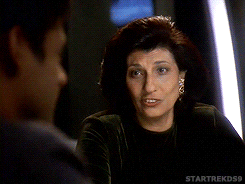airyairyquitecontrary:geekygothgirl:airyairyquitecontrary:startrekds9:Fadwa El Guindi as Amsha Bashi
airyairyquitecontrary:geekygothgirl:airyairyquitecontrary:startrekds9:Fadwa El Guindi as Amsha Bashir in 5.14 - Doctor Bashir, I Presume? [Feb 1997]It was when the producers began looking for soemone to play Bashir’s mother that they ran into real problems. “We wanted Arab-Americans to play both parents,” says director David Livingston. But it proved impossible to find a female Arab-American actor. “That’s because there are none,” points out Alexander Siddig. “Arab actresses are an oxymoron. Most Arabs are Muslim, and Islam frowns upon acting. No one outside of the family may see a woman without a headdress on, or see her cry or laugh. In the Islam world, you won’t see a woman acting, except in a place like Egypt, where the rules are more liberal, and even then there are very strict definitions of what a woman may or may not do. But the woman they found did an amazing job.” Credit Casting Director Ron Surma for finding Fadwa El Guindi, a social anthropology professor at the University of Southern California. “Ron had heard something about a woman who’d done some community theater in town.” says Livingston. “She had a real genuine empathetic quality about her when we brought her in to read, and we decided to go for it.” “It was such a marvelous moment,” smiles Ira Behr. “She was nervous as can be, but she had tremendous class. We told her to just be herself, and she was great.”- Deep Space Nine CompanionOn the other hand, they didn’t cast an Arab-American as Richard Bashir either. Brian George is British-Israeli, and has a gloriously complicated family background - his parents were Jews of Iraqi descent who were born in Lebanon and India. And he grew up in both England and Canada, and went to university in Toronto.And I like to imagine that the Bashir family tree is exactly that confusing, too.And that SOMEWHERE in there was a Wooster, because I DON’T KNOW HOW ELSE TO EXPLAIN JULIAN.I’d also like to point out that this was the mid-nineties and because they were determined to have an actor of the right ethnic group play Bashir’s mom they still managed to find one. Contrast that to all the “we put out a casting call for only white actors and then no Asian/black/Latin@ actors came so that’s why we couldn’t cast anyone who wasn’t white! Besides there aren’t any actors of the right ethnicity!” bullshit that we hear so often from whitewashing film and TV executives nowadays. True that.Also, Doctor Bashir didn’t have a specified ethnicity until they cast Siddig El Fadil. He was very much a blank-slate character at first, put in almost as an afterthought because there had to be a Chief Medical Officer, and they decided it would be fun to make him young, naïve, overly confident and keen. The character’s name was originally Julian Amoros (that surname is a bit on-the-nose) but it was altered to fit the casting. They were also deliberately looking for non-white actors to make the Starfleet cast diverse. And neither Julian nor his parents were ever given a specified nationality, or city or even region of origin on Earth. England is implied by Julian and Richard’s accents, but all we have to go on are English accents (Julian’s is evidently adopted rather than learned from his father, as it reflects a different social class) and an Arabic surname (which is also found among people who aren’t of directly Arabic extraction; there are Bashirs from Pakistan and India). Their family backstory must necessarily be one with elements of empire, colonialism and migration, but this isn’t made explicit.Another thing that isn’t remarked upon explicitly but that I always find interesting is, two of the most lovable characters, Chief O’Brien and Doctor Bashir, come from cultures that were colonised by England (well, large parts of South Asia and the Middle East were colonised by England, though not all) and had to free themselves from that oppression, and terrorism was involved in the process. The parallel with Bajor and Cardassia is never remarked upon, but it hangs there in the subtext, for me. And one of the ways Bashir and O’Brien find common ground on which to base their friendship is their shared elements of English culture - represented by the scene in which they drunkenly sing “Jerusalem” - which were imposed on their ancestors by colonialism.IT’S VERY COMPLEX AND INTERESTING. -- source link
Tumblr Blog : startrekds9.tumblr.com
#diversity#julian bashir#poc representation#whitewashing





